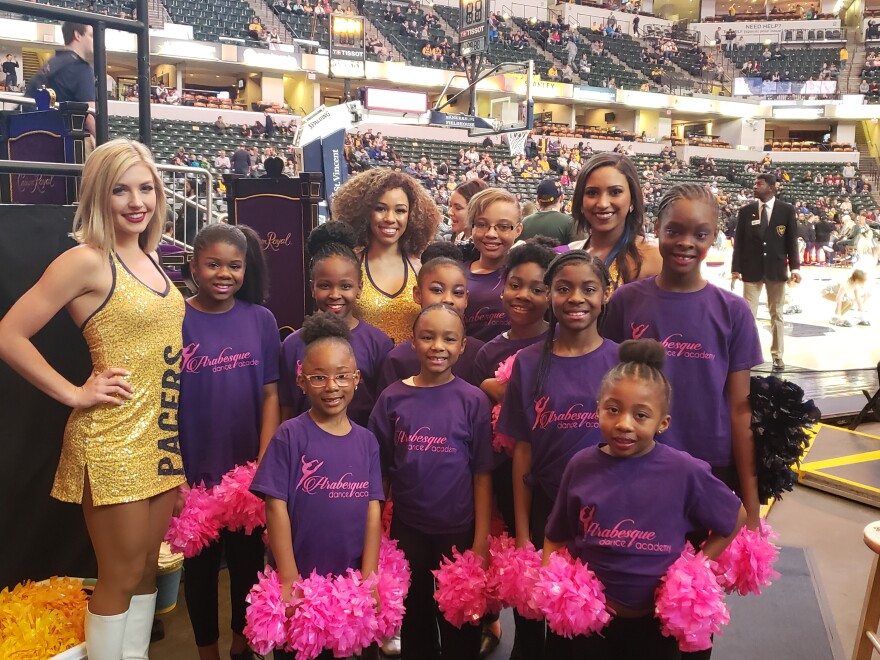Children in ballet slippers are able to practice their pliés and pirouettes at Arabesque Dance Academy in North College Hill thanks to a grant from Hamilton County's Small Business Relief Program funded by the federal CARES Act.
Owner Kimberly Stewart was forced to close the dance academy in March when Ohio shutdown gyms and recreation centers because of the coronavirus pandemic. "All of our funding comes through parents paying tuition ... and in our case if parents can't pay their tuition, we can't pay our studio bills, which is our rent, utilities, music licenses."
Stewart has about 200 students from North College Hill, Mt. Healthy and surrounding communities, though some come from as far away as Dayton and Northern Kentucky. The studio is considered a "Project Plié" studio, an American Ballet Theatre initiative to increase racial and ethnic representation in ballet and ballet companies. She explains it also means she serves children who might otherwise not have access to dance lessons.
The early days of the pandemic were scary for Stewart. On top of owning Arabesque Dance Academy, she works full time as a school social worker but still says she had to find a second job. She ended up supplementing the studio's losses by delivering groceries for Shipt, an online grocery delivery company. She also managed to offer some dance instruction online.
One day an email from the North College Hill Chamber of Commerce crossed her inbox, detailing Hamilton County's Small Business Relief Program. The county received $142 million in CARES Act funding. In the first round of grants in May, nearly 220 small businesses received $1.7 million to help cover things like payroll and utilities.
Arabesque Dance Academy was awarded $5,000.
Stewart was leery at first, thinking her business was probably too small and worrying she wouldn't be able to find all the necessary paperwork. "But the process, really, was not that bad. ... I went online, uploaded the required information and literally heard within an hour that we were being recommended for funding."

The funds allowed Arabesque Dance Academy to make it through the shutdown and reopen. She hired two additional teachers in order to split the dance classes into two rooms to allow for appropriate social distancing. The grant also helped her pay her bills and provide protective items to students such as masks, hand sanitizer and soap.
"More than anything, the grant has provided us with the opportunity to make sure kids are up and moving," she says. "Since March, kids have been stuck in the house. They haven't had real interaction with other children. Our studio being able to reopen, we're providing not only physical activity but we are supporting the social and emotional needs of kids in the community. They're interacting with each other, they're interacting with adults... face to face contact with other people and just not being locked indoors."
Stewart's studio also provides dance therapy for children going through the foster care system or those who aren't amenable to other types of therapy. She was able to offer online dance lessons during the shutdown, but found it harder to treat children through a screen.
"To be able to be face-to-face with them and have the opportunity to stay open to do that has been just amazing, and it's been tremendous for their mental and physical growth," she says.
Second Round Of Small Business Relief Grants
The second round of the Small Business Relief Program opens for applications Aug. 24. Harry Blanton, vice president and manager of HCDC (formerly the Hamilton County Development Co. Inc.), says the program will be a little different this time.
"The process should be easier," he says. "Previously we would not allow anyone to apply for the program if they had received any federal assistance through programs like the PPP (Paycheck Protection Program) or the disaster loan."
Now those business may apply as long as they haven't received more than $20,000. He explains they found out some business that had been excluded previously had actually only received $1,000 or $2,000, but because of the loan program, guidelines couldn't therefore apply.
Small businesses can find eligibility requirements and more information here. The application window is Aug. 24 - Sept. 4.



